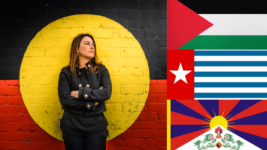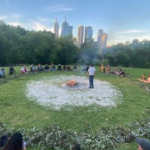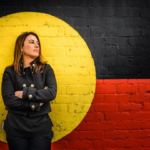Political Block on Atrocity Prosecutions Remains, As Major Parties Reject Genocide Reforms

The Labor-Liberal ruling duopoly voted down Senator Lidia Thorpe’s Genocide Bill in the Senate on Wednesday, which meant the major parties agreed that a political veto afforded the attorney general in respect progressing atrocity crime prosecutions, that ensures inequality before the law is maintained, so that political elites abroad and local politicians can be shielded from such charges.
The international criminal offences of genocide, crimes against humanity and war crimes are contained in Australian law, under division 268 of the Criminal Code Act 1995 (Cth). Yet, when the Howard government passed these laws in 2002, it further enacted the attorney general’s fiat, which provides that the nation’s chief lawmaker must either greenlight such prosecutions or deny them.
The attorney general’s fiat, as it stands, undermines the rule of law because it denies the basic principles of equality before the law and access to it, while further placing some individuals above it.
Introduced into parliament in February last year, the Genocide Bill has been of particular pertinence, as a livestreamed genocide has been and continues to be perpetrated by the Israeli state against the Palestinian civilians of the Gaza Strip, which has too brought into starker relief the ongoing genocide against the First Peoples of this continent.
But while the majors voting against Thorpe’s bill on the last sitting day of the 47th parliament was no surprise, a third of the Senate did vote to progress it, and those Greens and independents of the crossbench represent a growing portion of the constituency turning away from the ruling duopoly, in rejection of a political system that simply sweeps genocide and other matters under the carpet.
Blocking justice
“The bill before us today… is about access to justice,” Senator Thorpe told the chamber on Wednesday morning. “It ensures that the crime of genocide is able to be prosecuted in domestic courts without political interference. This bill embodies a commitment to transparency and accountability and an adherence to international human rights obligations.”
“Yet, when the Australian government ratified the genocide convention in 2002, they put in an extra sneaky, slimy provision that only the attorney general can bring a prosecution for genocide, that their decision cannot be challenged and that it cannot be applied to historical events,” the Gunnai, Gunditjmara and Djab Wurrung politician added.
The Criminal Code Amendment (Genocide, Crimes Against Humanity and War Crimes) Bill 2024 sought to remove the two sections of the Criminal Code that empower the attorney general to either greenlight or block the prosecution of genocide or any other atrocity crime on the books.
Indeed, the High Court found in 2019 that the attorney generals fiat results in a prosecution of a division 268 offence being required to be brought under the name of the current chief lawmaker, who, right now, is Labor MP Mark Dreyfus.
The most recent application of the AG’s fiat was in relation to a genocide prosecution raised by Krauatungalung elder Uncle Robbie Thorpe against Charles Windsor in the Victorian Supreme Court, as Justice Melinda Richards found in February that for the registrar to have issued a summons not only would the AG have to greenlight the prosecution, but the charge sheet should be in their name.
The attorney general’s fiat was also applied to block at attempt to prosecute then Myanmar state counsellor Aung San Suu Kyi in relation to the crime against humanity of deportation or forcible transfer of a population in regard to the Rohingya, and it was too applied in 2011, to block a genocide prosecution against then Sri Lankan PM Mahinda Rajapaksa over the mass slaughter of Eelam Tamils.
Thorpe added that the Senate inquiry into the bill “made clear that the fiat stands in the way of justice and is an almost insurmountable obstacle for victims of atrocity crimes”, while “every single one of the witnesses, besides the Attorney General’s Department itself, supported the measures in the bill”. However, the major party stacked inquiry went on to recommend against progressing it.
Ensuring atrocity crimes are never prosecuted
With the United Nations 1998 adopted Rome Statute of the International Criminal Court (ICC) coming into force on the 1 July 2002, all nation states a party to it were then required to enact the atrocity crimes contained in the statute into their domestic law. The atrocity crimes then held in the document were all forms of genocide, crimes against humanity and war crimes.
The ICC was brought into being to ensure that the perpetrators of the gravest crimes of all could be brought to justice, as often the perpetrators of such crimes are political leaders. Yet, of late, as the apartheid Israeli regime has continued to progress a wholesale slaughter of fellow human beings on the global stage, Tel Aviv and Washington have been concertedly undermining its authority.
The International Criminal Court (Consequential Amendments) Bill 2002 served to insert genocide, crimes against humanity and war crimes offences into division 268 of the Criminal Code, and they came into effect on 1 September 2002. These laws carry universal jurisdiction, meaning this nation can prosecute anyone for committing such an offence perpetrated anywhere on the planet.
But the Howard government also inserted sections 268.121 and 268.122 into the Criminal Code, with the initial section containing the fiat that allows the federal attorney general to block or bring an atrocity crime prosecution, and the latter section goes on to provide that once the chief lawmaker makes such a decision, it cannot be appealed or reversed.
Shadow AG Michaelia Cash told the Senate that the Coalition, and indeed, Labor, were voting against the removal of the AG’s fiat, as undertaking such a prosecution could undermine “the national security and foreign relations interests of all Australians”. However, Greens Senator David Shoebridge retorted that it actually serves to allow Australian pollies to block the prosecution of political mates.
In terms of the form Howard showed in inserting the political veto into the equation when dealing with the most serious of crimes, which are often perpetrated against First Peoples, it was on view once more when the UN adopted the Declaration on the Rights of Indigenous Peoples in 2007, as Australia was one of only four nations to vote against it, along with the US, Canada and New Zealand.
Silencing genocide facilitates its commission
Thorpe told the chamber on Wednesday that in its submission to the Senate inquiry, the Australian Tibet Council asserted that the Tibetan experience of oppression and dispossession under the Chinese regime has shown that the silencing that takes place around crimes like genocide serves to embolden perpetrators, and this is exactly the effect the attorney general’s fiat serves to propagate.
The Senator added that this is the case in relation to genocide anywhere on the planet, whether that be upon the First Peoples of this continent, the Palestinians in Gaza and the West Bank, the Uyghur in Xinjiang, the people of Tibet, Tamils in Sri Lanka, the Rohingya in Myanmar, the Sahrawis of Western Sahara, the West Papuans, the Masalit in Sudan and the people of eastern Congo.
“The Frontier Wars have never ended,” Thorpe made clear, “same war, different weapons, same oppression of our people for access to our land and our resources for the profit of a few.” And she added that despite the 1997 Bringing Them Home report finding the historical practice of forced Aboriginal child removals constituted genocide, the practice has simply escalated since that time.
“If you don’t support this bill, you are complicit in the ongoing genocide of my people and around the world, and, one day, you will all be held accountable because you’ve signed up to a convention,” Thorpe asserted right before the major parties voted to ensure that when powerful people stand to be charged with the most serious of crimes, they can step in to save them from the justice sought.
“You are breaking the law,” the Gunnai, Gunditjmara and Djab Wurrung woman warned. “You are breaking international law, and each and every one of you who do not support this bill today will be personally held accountable and responsible and will be called to a court of law to answer – maybe not today, maybe not tomorrow, but it will come.”







